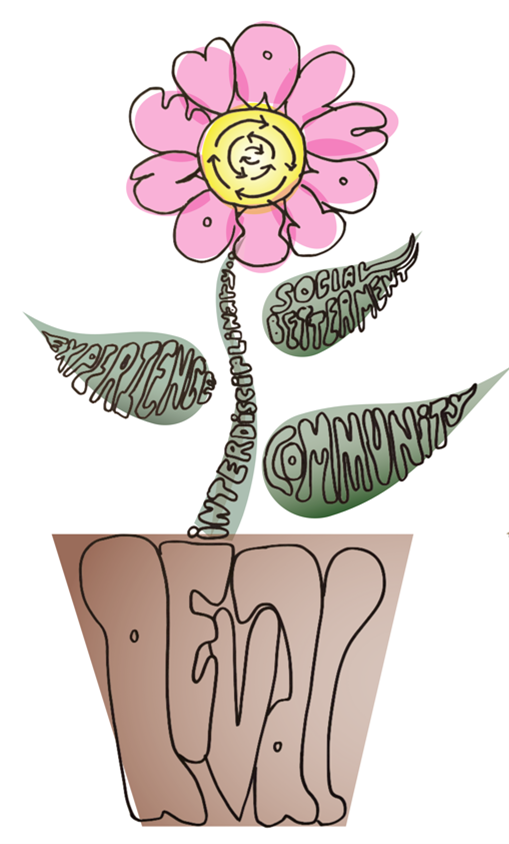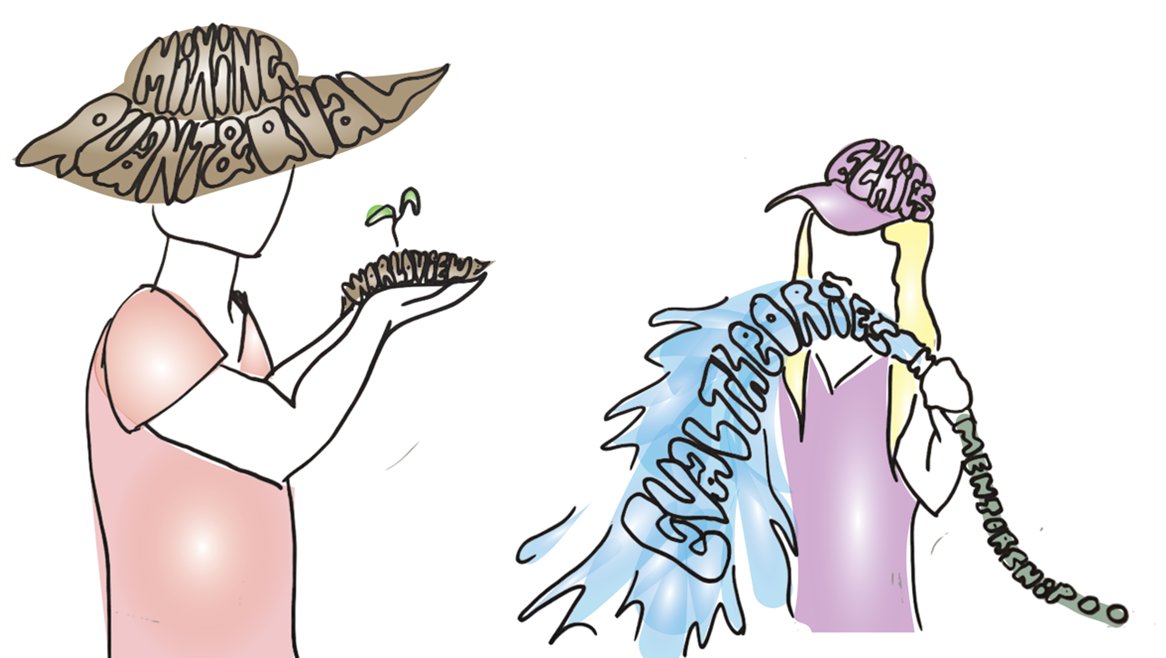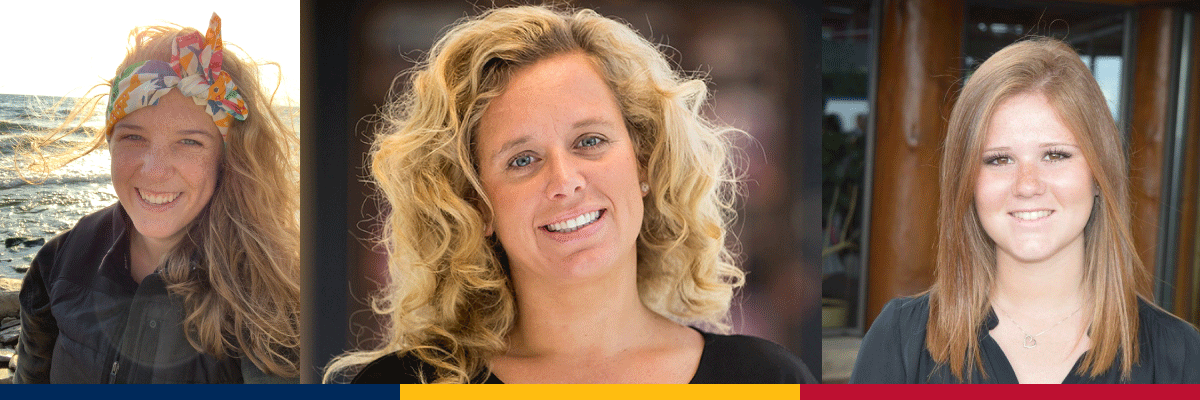In September 2020, we were graduate students and faculty members staring into the unfamiliar contemplating how to plan for the beginning of remote learning in ways that engaged people. Although our Faculty has shown its resilience, determination, and creativity with numerous successful efforts to maintain community engagement, facilitate relationships, and promote learning over the past couple of years, we wondered: How could one graduate course contribute to strong community building, learning, and friendship with the new pandemic safety rules? We imagined shaking up traditional forms of engagement and connecting with passionate learners and community members in our region, and beyond in ways that, without sounding too cliché, could make a difference.
From these ideas, one of our favourite initiatives grew, QEval– a compressed summer course that utilizes program evaluation as a lens for facilitating community-engagement. QEval, a unique blended learning experience that brings together learners from Queen’s and the University of Alberta for a month of online modules and a series of virtual connections before launching into a one-week intensive with a community partner.
The goal of QEval is to create an experiential learning environment for emerging evaluators by working with community partners who have an evaluation need. Evaluation contributes to continuous learning and informed decision-making (Budrionis & Bellika, 2016; Jankowski & Marshall, 2017), and is viewed as a core competency applicable across various sectors (Competencies for Canadian Evaluators, 2020) as a deliberate and intentional strategy for promoting community and social change. Students need engaged and applied experiences (Mignone et al., 2018) and QEval offers an opportunity to learn how to apply evaluation knowledge in community settings, ultimately preparing them to lead meaningful change in society.
QEval is dedicated to creating a positive impact by inviting community organizations to examine programs and practices of interest, probe issues and seek empirical answers (Cousins et al., 2004; Labin et al., 2012). Together, learners and community stakeholders ask questions and select methods that are designed to strategically improve programs. Through intentional reflection and capacity building activities, course meetings are used as a space to talk about real experiences with community partners, evaluation contexts, and interdisciplinary teams.

QEval had been offered in other formats at other universities before it came to Queen’s (Gokiert et al., 2021; Mignone et al., 2018), but we weren’t sure how it would fare in our virtual context. How would we recruit students? Are community partners interested in this type of experience right now? We had so many questions. When it came time to bring QEval to life we were relieved and surprised to see just how easily QEval slid onto participants’ radars and into the existing remote learning structures!
QEval is an experience that thrives on layers of teamwork in every way – as the course is being planned, during the multifaceted blended delivery, throughout the one-week intensive and in the post course reflections. The idea for this experience originated at the University of Manitoba, where friends developed the idea to teach program evaluation to university learners and community partners at the same time by using a community issue or case study as a context for evaluation (Mignone et al., 2018). The idea migrated to the University of Alberta (Gokiert et al., 2021) a few years ago before Dr. Michelle Searle partnered to establish QEval at Queen’s. As course designers, learners and facilitators with a couple years of experience under our belts, we are excited to continue developing the relationships, resources, and research that underpin QEval. This course is offered through the inaugural Education-in-Leaders Residence (ELiR) program (“Announcing the First Education Leaders in Residence,” 2022), focused on creating high-impact, interdisciplinary initiatives at Queen’s University . The experience begins with developing theoretical knowledge about the basics of the field of program evaluation while always keeping an eye on the practical and aspiring for transformational aims when it comes to relationships and reciprocity. Perhaps we write this from a biased perspective as researchers and practitioners in the field of program evaluation but QEval provides a context to share our passion with the transdiscipline (Scriven, 2008). Those involved in QEval describe it as a powerful learning experience that catalyzes growth in students, partners, and facilitators while revealing just how much program evaluation has to offer. It’s hard to say which is the “magical” ingredient, if any... somewhere among the blend of individual learning, team activities, partner engagement, and the presence of numerous mentors, something special happens that most participants can feel.

Our favourite part of QEval is the revelation that learners experience as they realize that they are not limited to one discipline. That the expertise they developed over the course of their academic training has provided the foundation for other professional work opportunities. There are programs that need students with transdisciplinary knowledge who are interested in using their skills for social betterment; QEval highlights this need. Don’t believe us? See for yourself at the next offering of QEval 2023 or come to the QEval Reunion Friday September 9 at 2 pm on Zoom, contact Michelle Searle for details and watch the Education Newsletter for more information.
References
References Announcing the first Education Leaders in Residence. (2022, February 22). Queen’s Gazette. https://www.queensu.ca/gazette/stories/announcing-first-education-leaders-residence
Budrionis, A., & Bellika, J. G. (2016). The Learning Healthcare System: Where are we now? A systematic review. In Journal of Biomedical Informatics (Vol. 64, pp. 87–92). Academic Press Inc. https://doi.org/10.1016/j.jbi.2016.09.018
Competencies for Canadian Evaluators. (2020). Canadian Evaluation Society. https://evaluationcanada.ca/competencies-canadian-evaluators
Cousins, J. B., Goh, S. C., Elliot, C. J., & Bourgeois, I. (2004). Framing the capacity to do and use evaluation. In J. B. Cousins & I. Bourgeois (Eds.), Organizational Capacity to Do and Use Evaluation - New Directions for Evaluation (pp. 7–23). Wiley Periodicals Inc. and the American Evaluation Association.
Gokiert, R. J., Daniels, J., Poth, C., Karbabian, A., Peacock, D., Springett, J., Cor, K., Williamson, D., Wallace, E., Freeborn, C., Taylor, M., Jun, S., Brazil, J., Pittman, S., Diamond, A., & Popescu, C. (2021). UEval: Bringing community-based experiential learning to the evaluation classroom. Canadian Journal of Program Evaluation, 35(3), 282–295. https://doi.org/10.3138/CJPE.69703
Jankowski, N. A., & Marshall, D. W. (2017). Degrees that matter: Moving higher education to a learning systems paradigm. Stylus Publishing. Labin, S. N., Duffy, J. L., Meyers, D. C., Wandersman, A., & Lesesne, C. A. (2012). A Research Synthesis of the Evaluation Capacity Building Literature. American Journal of Evaluation, 33(3), 307–338. https://doi.org/10.1177/1098214011434608
Mignone, J., Hinds, A., Duncan, K. A., Migliardi, P., Krawchuk, M., & Kinasevych, B. (2018). One-room school: The summer institute in program evaluation. Canadian Journal of Program Evaluation, 33(2), 268–278. https://doi.org/10.3138/CJPE.42195
Scriven, M. (2008). The Concept of a Transdiscipline: And of Evaluation as a Transdiscipline. Ideas to Consider Journal of MultiDisciplinary Evaluation, 5(10). http://www.jmde.com/
About the Authors
Paisley Worthington (she/her) is a PhD student at Queen’s focusing on how program evaluation can be used for social change in university contexts. She holds BSc and MSc degrees from the University of Guelph and has experience in curriculum development, quality assurance, and the scholarship of teaching and learning in higher education.
Michelle Searle is an Assistant Professor of Educational Evaluation at Queen’s Faculty of Education. Learn more about her research.
Katrina Carbone, OCT (she/her) is a doctoral student at Queen’s University. Her research focuses on how assessment can be used to promote and support student learning in K-12 and higher education. Other areas of interest include pre-service teacher education, educational technology, and program evaluation. Katrina holds a Bachelor of Social Sciences from the University of Ottawa, and BEd and MEd degrees from Queen’s University.
